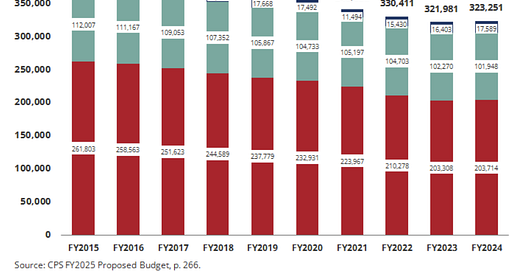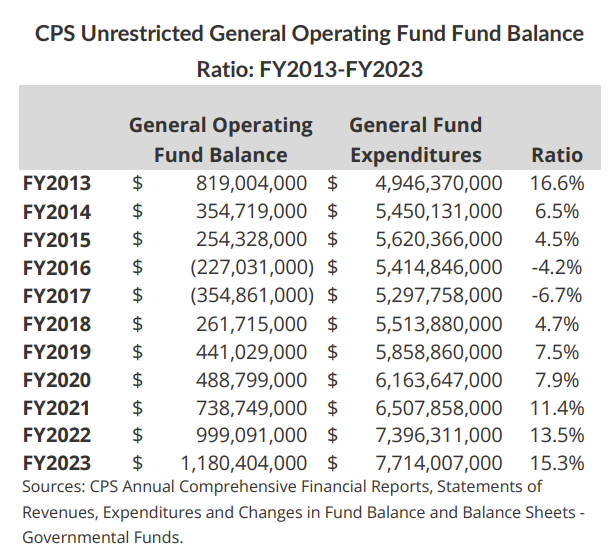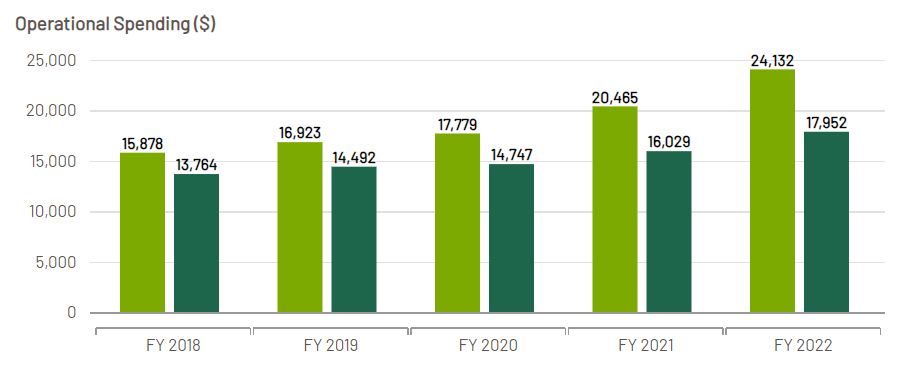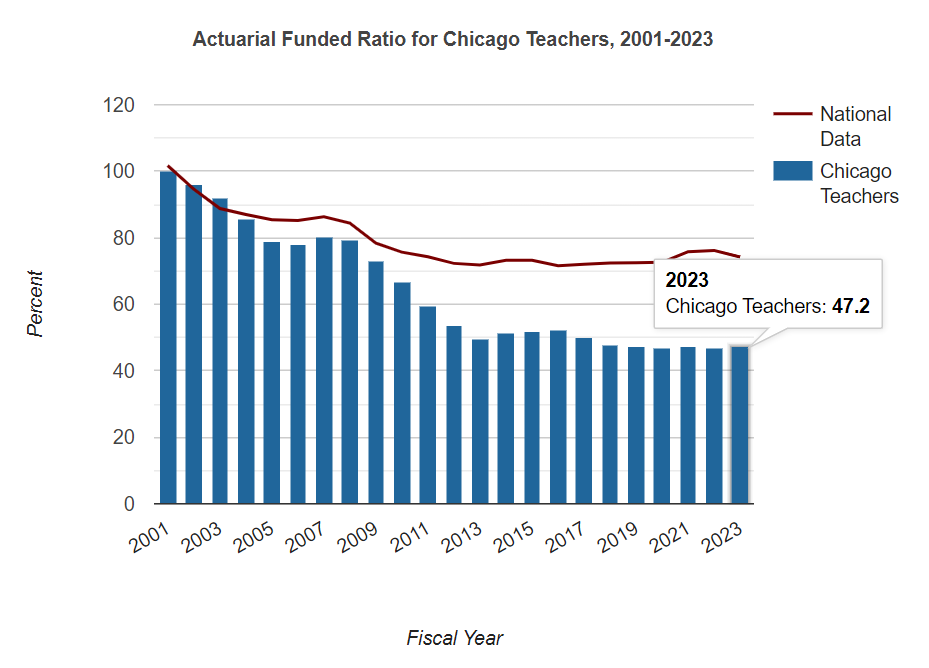Chicago Watch: Prior School Board Out, Funding Postponed to Chicago Public Schools
More to come as legacy costs squeeze Chicago (and Illinois)
Thanks to Chicago and its doughty mayor Brandon Johnson for lifting my spirits. Stuart’s funeral Mass was on Wednesday, so this bit of news was just the thing to brighten my day on Thursday:
Politico, 10/10/2024: City Council sizzle
WE SPENT THE DAY in the Chicago City Council meeting, where there was a lot of drama. But in the end, most issues were shoved off for future meetings, including concerns about the school board upheaval, debate about ShotSpotter and a plan to refinance $1.5 billion in debt.
Council war 2.0. “Maybe the acrimony didn’t rival the ‘Council Wars’ power struggle of the 1980s, when 29 aldermen, mostly white, thwarted Mayor Harold Washington’s every move. But it’s getting there,” writes the Sun-Times’ Fran Spielman. Her full story is here.
At issue: Aldermen fumed Wednesday over the Chicago School Board stepping down last week after refusing to fire Chicago Public Schools CEO Pedro Martinez, who has rejected Mayor Brandon Johnson’s push for the schools to take out a short-term, high-interest loan to pay their bills.
They want answers. The aldermen were set to hold a special meeting to address the upheaval at the school board but changed course when Ald. Jeanette Taylor (20th), who chairs the Education Committee, called for a separate meeting Oct. 18.
….
Next move: City Council members implore state lawmakers to limit mayoral authority in wake of CPS shakeup, by NBC 5’s Mary Ann Ahern
Also causing friction: A few of Johnson’s opponents were able to delay the mayor’s plan to refinance $1.5 billion in city debt to help shore up budget shortfalls. The plan will return for the next council meeting.
There is a power struggle around Chicago Public Schools, stemming from the money issue.
In particular, Brandon Johnson, supporting the budget the Chicago Teachers Union wants, has an expenditure ask that extends well beyond current revenue support.
So he wants the use of the credit cards.
And if you don’t give him the credit cards…
A Tortured Analogy in School Expenditures
Let’s go to the quote:
KRISTINA WATROBSKI | Crisis in the Classroom: Chicago mayor likens critics of school spending plan to supporters of slavery
Chicago Mayor Brandon Johnson on Monday accused critics of his proposed spending plan for Chicago Public Schools of echoing arguments used by supporters of slavery.
Mayor Johnson's remarks came as he announced six of his new appointees to the Chicago Board of Education. The mayor's office and school board announced Friday that all seven current members will resign this month, explaining the moves are part of a "transition plan" ahead of the board shifting to a hybrid elected and appointed format.
However, some have raised concerns the "unprecedented" resignations were the result of pressure from the mayor's office to approve a high-interest $300 million loan to cover certain pensions and Chicago Teachers Union demands. Dozens of members of the Chicago City Council signed a letter Saturday demanding a hearing be held prior to the official appointment of the new "lame-duck" school board.
Hecklers disrupted Mayor Johnson's remarks Monday, with some chanting "this board is not legit" as he attempted to introduce his appointees. The mayor quickly brushed them off, accusing them of playing politics.
….
"The so-called fiscally responsible stewards are making the same argument when our people wanted to be liberated and emancipated in this country," the mayor said. "The argument was you can't free Black people because it would be too expensive. They said that it would be fiscally irresponsible for this country to liberate Black people."
There were quite a few other arguments than that, and the “expenditures” went beyond money expense, just as a reminder. But we’re not refighting the Civil War today.
The nuts thing is Brandon Johnson is trying to add potentially billions of dollars to the CPS budget on top of a budget with a $500 million gap already built in.
And falling enrollment.
Quick Look at Enrollment and Budget
The Civic Federation has a good analysis of the CPS budget, dated July 24, 2024. This is before Brandon Johnson “negotiated” a contract with the CTU at the end of August, which would boost costs well beyond what is seen below.
In the PDF of the analysis, on numbered page 32 is the enrollment:
From FY2015 to FY2024, total enrollment has fallen by a cumulative 18.5%, at a compound annual rate of 2.2% decrease per year.
Let’s check how expenditures have changed:
Okay, that expenditures column includes loads of stuff, such as pension contributions, including payments for unfunded liabilities… is it any wonder it goes up almost every year, even though enrollment was falling?
[Note: this is General Fund, not Capital Fund, so this is covering operating expenses. Like pensions — which, yes, are operating expenses]
To make it simpler, the Illinois Report Card splits out the expenditures:
This is the per-pupil average spending for CPS, by fiscal year, compared against the state average.
From FY2018-FY2022, the per-pupil spending for CPS increased by a cumulative 48%, while for the state, it increased by 30%.
For the larger category of operational expenditures on a per-pupil basis:
Instructional expenditures are a subset of operational expenditures.
Again, the state expenditures on a per-pupil basis increased about 30% over the period, while the CPS per-pupil operational expenditures increased by 52%.
This does not include capital expenditures.
I’m going to guess much of the difference comes from the step up in pensions expenditures, but wait….
Both Chicago Teachers and Illinois Teachers Pensions are Not in a Good Place
A big reason these expenditures have been rising has been due to the deeply underfunded teachers’ pensions.
I have addressed why underfunded teachers’ pensions are a big problem several times before. This is the best nutshell post:
Happy Back to School Time! State of U.S. Teachers Pensions 2023
It’s back to school time up here in New York, so what a perfect time to revisit an old post: Teacher Pensions: A Big Problem for Many States.
That was about teachers’ pensions for the U.S. overall, but Illinois Teachers and Chicago Teachers funds are particularly highly stressed. (All data and graphs are from the Public Plans Database as of today.)
Chicago Teachers funded ratio history
Illinois Teachers funded ratio history
The red line in both graphs are the same, showing the trajectory of the average funded status of teachers funds in the U.S., going from about full-fundedness (100%) in FY2001, down to about 75% funded in FY2023.
Illinois Teachers was never fully-funded. That is its own story.
Chicago Teachers used to be fully-funded, in FY2001, as so many other teachers’ pensions.
Before the financial crisis, the Chicago Teachers fund slid to 80% fundedness, and then slid further post-crisis, to about 50% fundedness, and has been treading water ever since.
Pay When The Costs are Due, and Perhaps You Won’t Accrue Debt
A big part of the current spending hangover in Chicago is a bunch of debt that comes from not paying for one’s costs when accrued.
The teachers’ pensions are a big part of that.
The blue part of the graph is the part of the pensions that actually got paid for, year-by-year. The red part is the bit by which they fell short.
In this graph, the only year Chicago came close to fully paying for their pension promises was FY2017, when they paid 98.7% of the “required” contribution.
The required contribution that year was 37% of the payroll.
For FY2022, the last year on this graph, the required contribution was 48% of the payroll.
Every year the contribution falls short, and the investments fall short, and the pension pays out more than expected … the contribution amount required to keep things sustainable grows.
That’s even before we consider contract “negotiations” over salaries and their trajectories.
Borrowing for the Operational Costs Doesn’t Fix the Problem
By the way, those red bars? In the “required” contribution?
That’s borrowing, too. That’s adding to the pension debt, which is a long-term debt that nobody seems to take seriously. It’s pretended that it won’t be defaulted on (though it has been in many cases — and I collect those cases as examples.)
At least the Chicago City Council realized that adding to the short-term debt to pay for the CTU (Chicago Teachers Union) desires for a short-term extra $300 million boost… which people already knew would grow.
The Civic Federation’s pre-CTU deal boost analysis showed a $500 million deficit for FY2025, projecting a $900 million deficit for FY2026.
That was before Brandon Johnson was trying to tack on additional costs, which would likely amplify not only the cash needs to cover salaries for that year, but also the pension contributions to cover the benefit boosts that come from higher salaries.
Obviously, Johnson is looking to pack the school board right now, and seeking other revenue sources, but this is not great timing for him. Illinois and Chicago in particular may be in the bag for Democrats for the 2024 election season, but neither polity is all that up for additional taxes right now. Federal bailouts right now are also extremely unlikely. Self-created financial disasters will not get much sympathy compared to the natural variety.
So this is just the first round in the financial wrangling… Brandon Johnson may find that there is no money for the deal he had made with the CTU…. and the reason will be promises that were made (and not paid for) decades ago.











